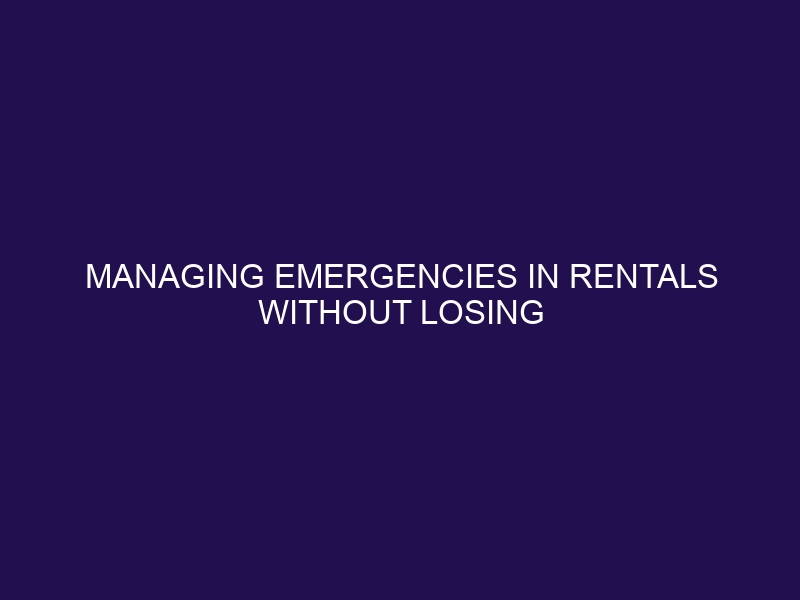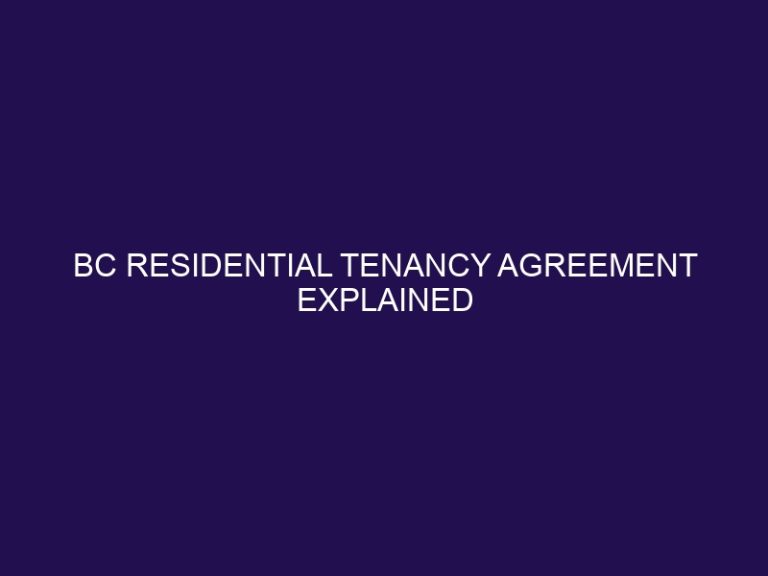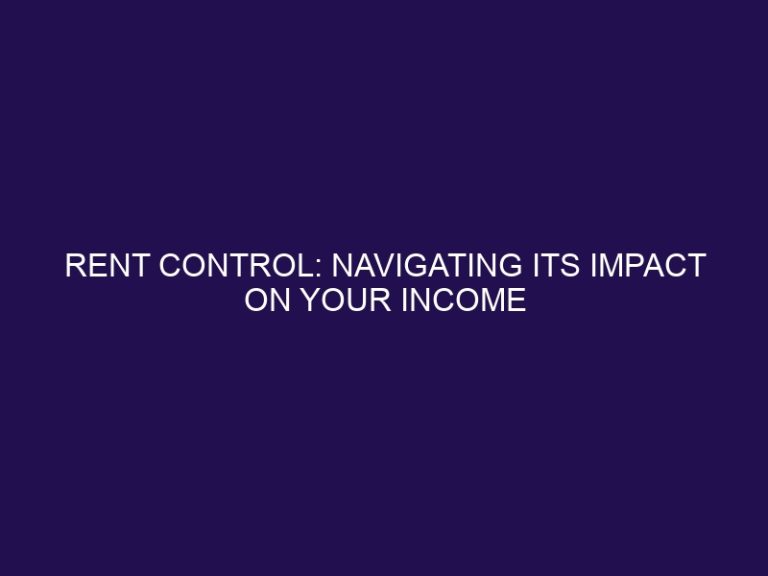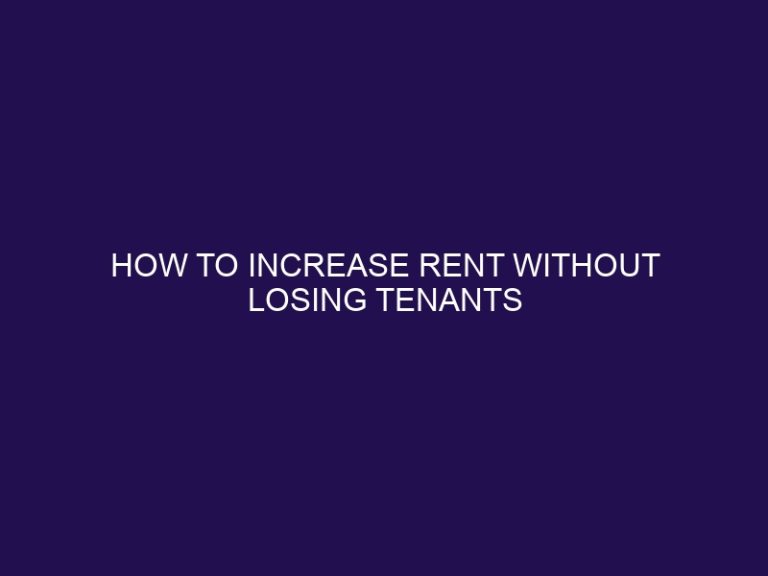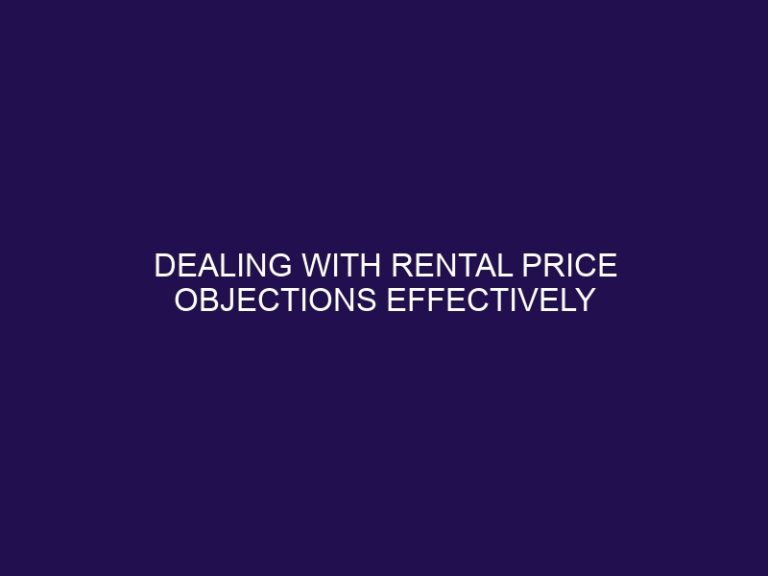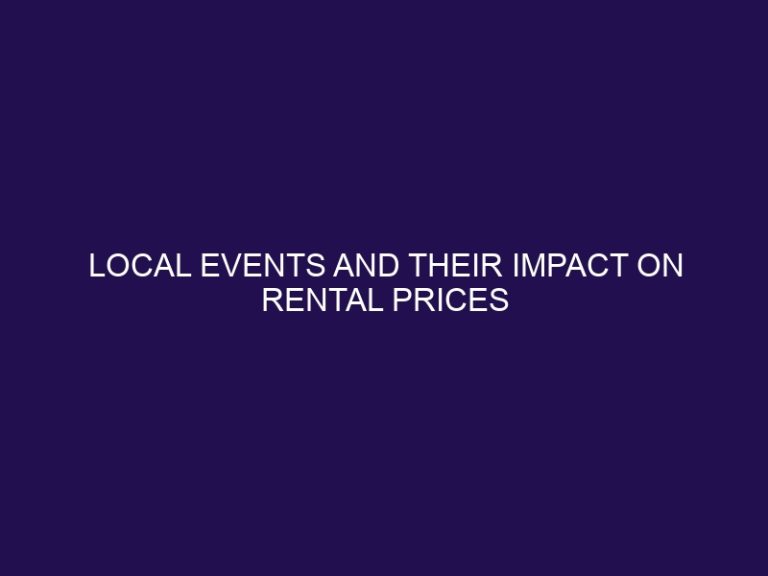Managing Emergencies in Rentals Without Losing Income
Introduction: Understanding Emergencies in Rental Properties
Managing a rental property comes with its own set of challenges, one of which is dealing with emergencies. Emergencies in rental properties can range from minor issues like a leaky faucet to major disasters like floods or fires. These unexpected events can not only be stressful but also result in significant financial losses if not handled properly. Therefore, it is essential to have a plan in place to manage emergencies without losing income.
Preventative Measures to Reduce Emergencies
One of the best ways to handle emergencies is to prevent them from happening in the first place. Here are some preventative measures that can help reduce the likelihood of emergencies in your rental property.
- Regular Maintenance Checks: Conducting regular maintenance checks can help identify and fix any potential issues before they turn into emergencies.
- Setting Clear Rules and Expectations for Tenants: Clearly outlining rules and expectations for tenants, such as proper garbage disposal and no smoking policies, can prevent emergencies from occurring.
- Educating Tenants on Basic Maintenance Tasks: Educating tenants on basic maintenance tasks like changing air filters or cleaning gutters can help prevent minor issues from becoming emergencies.
Creating an Emergency Plan
Despite taking preventative measures, emergencies can still occur in rental properties. Having a plan in place can help minimize the impact of these emergencies. Here are some steps to create an effective emergency plan.
- Identifying Potential Emergencies: Take the time to identify potential emergencies that can occur in your rental property, such as power outages, plumbing issues, or natural disasters.
- Establishing Emergency Contacts: Compile a list of emergency contacts, including plumbers, electricians, and other contractors who can quickly respond to emergencies.
- Communicating the Emergency Plan to Tenants: It is crucial to communicate the emergency plan to your tenants, so they know the appropriate actions to take in case of an emergency.
Dealing with Emergencies as They Arise
When an emergency does occur, it is essential to act quickly and efficiently. Here are some tips to help you manage emergencies in your rental property.
- Prioritizing Emergencies: It is crucial to prioritize emergencies based on their severity and potential impact on your property and tenants.
- Communicating with Tenants and Contractors: Keep your tenants informed about the emergency and communicate with contractors to resolve the issue promptly.
- Documenting the Emergency and Its Resolution: Be sure to document the emergency and how it was resolved, as this can be helpful for insurance purposes and future reference.
Minimizing Loss of Income During Emergencies
Emergencies can result in the loss of income for rental property owners. Here are some ways to mitigate this loss.
- Offering Temporary Housing Solutions: If the rental property is unlivable due to an emergency, consider offering temporary housing solutions for your tenants.
- Communicating with Insurance Providers: If the emergency is covered by your insurance, be sure to communicate with your insurance provider to ensure proper coverage and swift resolution.
- Implementing a Rent Relief Program: If tenants are unable to pay rent due to the emergency, consider implementing a rent relief program to help them during this time.
Conclusion: Preparing for Emergencies and Protecting Your Rental Income
Emergencies can happen at any time in your rental property, but with proper preparation and a well-executed plan, they can be managed without causing significant financial losses. By taking preventative measures, creating an emergency plan, and effectively dealing with emergencies as they arise, you can protect your rental income and maintain a positive relationship with your tenants.
Preventative Measures to Reduce Emergencies
As a rental property owner, emergencies can cause major disruptions and financial setbacks. However, by taking preventative measures, you can reduce the likelihood of emergencies occurring in your rental units. In this section, we will discuss three key strategies to help minimize the chances of emergencies: regular maintenance checks, setting clear rules and expectations for tenants, and educating tenants on basic maintenance tasks. By implementing these measures, you can save yourself time, money, and stress in the long run.
1. Regular Maintenance Checks
- Regularly inspect plumbing, electrical systems, and HVAC.
- Check for leaks, mold, and structural issues as part of your regular maintenance checks.
- Make sure to test smoke detectors, carbon monoxide alarms, and fire extinguishers regularly to ensure they are in proper working condition.
2. Setting Clear Rules and Expectations for Tenants
- Create a comprehensive lease agreement outlining tenant responsibilities and expectations.
- Establish clear guidelines for property maintenance and usage of common areas.
- Communicate restrictions on noise levels, parking regulations, and waste disposal procedures.
3. Educating Tenants on Basic Maintenance Tasks
- Provide tenants with a maintenance manual.
- Conduct workshops on simple tasks like changing light bulbs or unclogging drains to educate tenants on basic maintenance tasks.
- Offer online resources for troubleshooting minor issues and further educating tenants on basic maintenance tasks.
Creating an Emergency Plan
As a rental property owner, it is crucial to have an emergency plan in place to protect your property and your income. This section will cover the necessary steps to create a comprehensive emergency plan for your rental property. We will discuss how to identify potential emergencies that may occur, establish emergency contacts, and effectively communicate the emergency plan to your tenants. With a well-developed emergency plan, you can be prepared for any situation and minimize the impact on your rental income.
1. Identifying Potential Emergencies
- Conduct regular property inspections to identify potential emergencies and address them early.
- Educate tenants about common emergencies like leaks or power outages to ensure they know how to handle them.
- Assess potential risks, including fire hazards or plumbing problems, to prevent emergencies from occurring.
2. Establishing Emergency Contacts
- Create a comprehensive list of essential contacts, including local authorities, emergency maintenance services, and utility companies.
- Make sure that tenants have access to this list and are aware of the proper procedure for contacting each party in case of emergencies.
- Regularly review and update the contact information to ensure accuracy.
3. Communicating the Emergency Plan to Tenants
- Schedule a meeting or distribute a written document outlining the emergency plan to tenants.
- Ensure that tenants are fully informed about emergency procedures and know how to contact the appropriate authorities.
- Educate tenants on the location of emergency resources and essential utility shutoffs.
Dealing with Emergencies as They Arise
In the world of rental properties, emergencies are bound to happen. As a landlord or property manager, it is crucial to know how to handle these situations effectively without sacrificing income. This section will cover the necessary steps to take when dealing with emergencies as they arise. We will discuss the importance of prioritizing emergencies, effective communication with tenants and contractors, and the importance of proper documentation for future reference. With these strategies in place, you can minimize the impact of emergencies on your rental income.
1. Prioritizing Emergencies
- Assess the severity and potential impact on tenant safety and property damage.
- Prioritize emergencies based on the criteria for immediate threat and urgency for resolution.
- Consider factors such as gas leaks, flooding, fire, or structural damage when determining priority.
Pro-tip: Regularly review and update the prioritization criteria to adapt to changing circumstances and feedback from tenants.
2. Communicating with Tenants and Contractors
- Keep tenants regularly updated on maintenance schedules and any potential disruptions.
- Establish clear communication channels for reporting issues and provide emergency contacts.
- Ensure contractors have detailed instructions, access, and contact information for efficient resolution of any problems.
3. Documenting the Emergency and Its Resolution
- Record Details: Document the nature and extent of the emergency, including photos or videos.
- Action Taken: Outline the steps and measures implemented to resolve the emergency.
- Communication: Keep records of all communications with tenants, contractors, and relevant authorities.
Minimizing Loss of Income During Emergencies
When an emergency occurs in a rental property, it can be a stressful and uncertain time for both landlords and tenants. In this section, we will discuss strategies for minimizing the loss of income during emergencies. From offering temporary housing solutions to communicating with insurance providers, we will explore various ways to mitigate financial losses. Additionally, we will also discuss the importance of implementing a rent relief program to support tenants and maintain a stable income for landlords during these challenging situations.
1. Offering Temporary Housing Solutions
- Provide temporary housing solutions, such as arranging nearby hotels or serviced apartments.
- Communicate with tenants to gather information about their housing needs and preferences.
- Ensure that the temporary housing is conveniently located within a reasonable distance from the rental property.
Pro-tip: Collaborate with local accommodation providers to secure discounted rates for temporary housing options.
2. Communicating with Insurance Providers
- Review insurance policy details carefully, ensuring coverage for rental property emergencies.
- Notify insurance providers promptly in the event of an emergency, providing comprehensive documentation and effectively communicating with them.
- Stay updated on any changes in insurance coverage and regulations by regularly communicating with insurance providers.
3. Implementing a Rent Relief Program
- Evaluate the financial impact on tenants due to emergencies.
- Offer temporary rent reductions or deferrals through the implementation of a Rent Relief Program.
- Provide resources for financial assistance programs to help alleviate the burden on tenants.
Frequently Asked Questions
What is considered an emergency maintenance issue?
Any maintenance issue that could potentially cause injury, serious property damage, or a threat to health and safety is considered an emergency. This includes issues such as bursting pipes, extreme heat conditions, and medical emergencies.
What steps should a landlord take in case of a maintenance emergency after hours?
A landlord should first assess the situation and determine if it is an emergency. If so, they should contact emergency services and then notify the tenant of the steps they should take. They should also be reachable and provide clear instructions on how to handle the situation.
How can a landlord prevent emergency repairs in rental properties?
Landlords can take proactive measures to minimize the likelihood of emergencies by regularly reviewing and maintaining the property. This includes checking for potential issues such as faulty outlets, dirty filters, and overloaded circuits. Regular maintenance and inspections can help prevent emergency situations.
What should landlords do to handle emergency maintenance requests from tenants?
Landlords should have a clear and detailed emergency maintenance policy in place to avoid confusion and ensure prompt and efficient handling of emergencies. They should also maintain open communication with tenants and keep them informed and updated throughout the process.
How can landlords prepare for unexpected expenses and emergencies in rental properties?
One way landlords can prepare for unexpected expenses and emergencies is by having an emergency fund specifically for their rental property. This can act as a financial cushion in case of job loss or other circumstances change. Landlords can also consider gradually increasing their savings goals and setting aside a certain amount each month for rental property emergency funds.
What essential tools should every rental property owner have in their emergency repair toolkit?
Some essential tools that landlords should have in their emergency repair toolkit include spare parts, plumbers tape, duct tape, Teflon tape, a face mask, safety goggles, and protective gear. These tools can come in handy for quick fixes and temporary solutions until a professional can address the issue.

